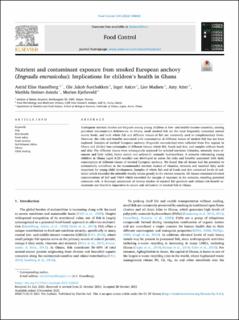Nutrient and contaminant exposure from smoked European anchovy (Engraulis encrasicolus): Implications for children's health in Ghana
Hasselberg, Astrid Elise; Nøstbakken, Ole Jakob; Aakre, Inger; Madsen, Lise; Atter, Amy; Steiner-Asiedu, Matilda; Kjellevold, Marian
Peer reviewed, Journal article
Published version
Permanent lenke
https://hdl.handle.net/11250/3011112Utgivelsesdato
2022Metadata
Vis full innførselSamlinger
- Articles [3012]
- Publikasjoner fra CRIStin [3070]
Sammendrag
Inadequate nutrient intakes are frequent among young children in low- and middle-income countries, causing prevalent micronutrient deficiencies. In Ghana, small smoked fish are the most frequently consumed animal source foods, and both whole fish and different tissues of fish are commonly used in complementary foods. However, the risks and benefits associated with consumption of different tissues of smoked fish has not been explored. Samples of smoked European anchovy (Engraulis encrasicolus) were collected from five regions in Ghana and divided into subsamples of different tissues: whole fish, heads and skin, and samples without heads and skin. The different tissues were subsequently analyzed for selected nutrients (vitamins, minerals, trace elements and fatty acids), heavy metals and polycyclic aromatic hydrocarbons. A scenario referencing young children in Ghana (aged 6-23 months) was developed to assess the risks and benefits associated with daily consumption of different tissues of smoked European anchovy. We found that all tissues had the potential to substantially contribute to the recommended nutrient intakes of vitamins, minerals and essential fatty acids important for young child development. Samples of whole fish and of heads and skin contained levels of cadmium which exceeded the tolerable weekly intake greatly in the current scenario. All tissues contained elevated concentrations of BaP and PAH4 which exceeded the margin of exposure in the scenario, entailing potential consumer risk. A thorough assessment of dietary intakes of smoked fish products and refined risk-benefit assessments are therefore imperative to secure safe utilization of smoked fish in Ghana.
